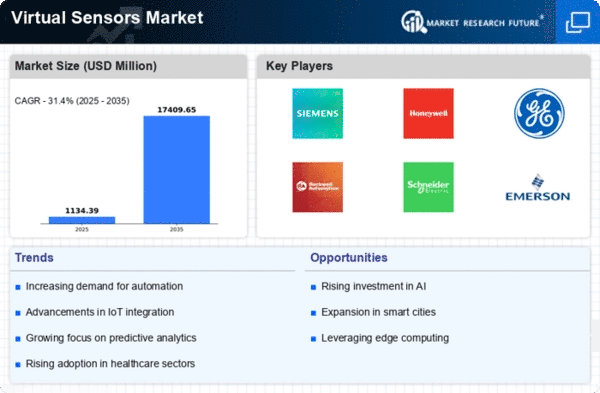Top Industry Leaders in the Virtual Sensors Market

Competitive Landscape of the Virtual Sensor Market: A Landscape of Innovation and Agility
The virtual sensor market, a rapidly burgeoning segment within the broader sensor landscape, is experiencing explosive growth fueled by its ability to offer cost-effective and adaptable alternatives to traditional physical sensors. This burgeoning market presents a dynamic and competitive environment, with established players and emerging startups vying for dominance. Understanding this landscape is crucial for potential entrants and established players alike.
Key Players:
-
Aspen Technology Inc
-
Algorithmica Technologies GmbH
-
Elliptic Laboratories
-
General Electric Company
-
OsiSoft LLC
-
Siemens AG
-
Rockwell Automation
-
ANDATA
-
SmartUQ LLC
-
Tactile Mobility
-
Schneider Electric
-
IntelliDynamics
-
LMI Technologies
-
Modelway
Strategies Adopted:
Competition in the virtual sensor market is fierce, leading to the adoption of diverse strategies. Some key approaches include:
-
Product Differentiation: Players are constantly innovating to differentiate their offerings. This could involve focusing on specific sensor types (e.g., virtual cameras, virtual microphones), developing advanced algorithms for data analysis, or integrating virtual sensors with existing platforms and ecosystems.
-
Partnerships and Collaborations: Recognizing the value of collaboration, many players are forging strategic partnerships with complementary companies. This allows them to access new technologies, reach broader markets, and accelerate product development.
-
Vertical Market Focus: Several players are focusing on specific verticals with high potential for virtual sensor adoption, such as manufacturing, automotive, and healthcare. This allows them to tailor their offerings to meet the unique needs of each industry and gain a competitive edge.
-
Open-source Platforms: Some companies are opting for open-source virtual sensor platforms, fostering community development and accelerating innovation. This approach attracts developers and expands the ecosystem, ultimately benefiting all stakeholders.
Factors for Market Share Analysis:
Analyzing market share in the virtual sensor market requires considering various factors:
-
Product Portfolio Breadth and Depth: Companies with a diverse range of virtual sensors catering to different applications and industries are likely to hold a larger market share.
-
Technological Expertise: Players with advanced algorithms, data processing capabilities, and expertise in specific sensor types hold a significant advantage.
-
Industry Adoption: Companies with strong partnerships and established presence in key verticals are likely to command a larger market share.
-
Customer Satisfaction and Brand Reputation: Positive customer experiences and a strong brand reputation can significantly impact market share.
New and Emerging Companies:
The virtual sensor market is witnessing a surge of new and emerging companies, driven by the technology's vast potential. These startups are often nimble and innovative, focusing on niche applications or developing disruptive technologies. Some notable examples include Vectra AI, specializing in virtual gas sensors, and Sensifai, offering AI-powered virtual sensors for smart buildings.
Current Company Investment Trends:
Companies across the spectrum are actively investing in the virtual sensor market. Key trends include:
-
Research and Development: Significant investments are directed towards developing advanced algorithms, improving data processing capabilities, and exploring new sensor types.
-
Acquisitions and Mergers: Established players are acquiring promising startups to expand their offerings and gain access to innovative technologies.
-
Partnerships and Collaborations: Companies are actively forging partnerships with research institutions, universities, and other technology players to accelerate innovation and market penetration.
-
Marketing and Sales Initiatives: Increased focus is placed on educating potential customers about the benefits of virtual sensors and expanding sales channels.
Latest Company Updates:
-
January 17, 2024: Siemens announced a new partnership with Microsoft to develop AI-powered virtual sensors for industrial applications.
-
December 20, 2023: Bosch unveiled a new virtual sensor platform that can be used for a variety of automotive applications.
-
November 15, 2023: GE Healthcare launched a new virtual patient monitoring system powered by AI and virtual sensors.










